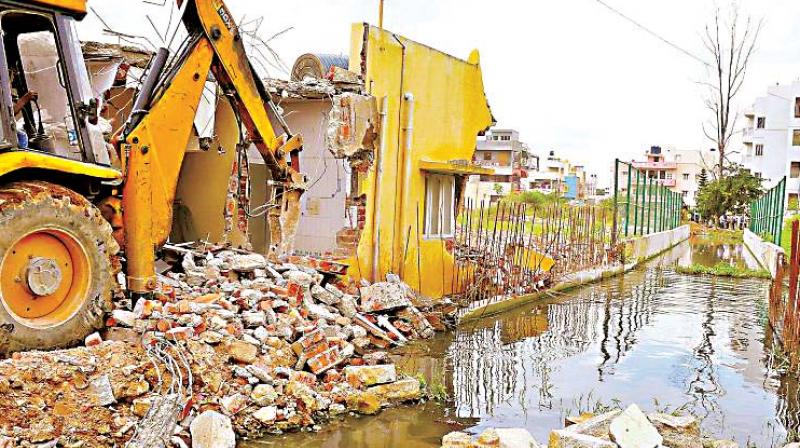If you don't wake up now, Bengaluru will go Kodagu way
The government's policies are dictated by business groups and contractors with vested interests owing to the large money involved.

The merciless destruction of greenery in the name of infrastructure development and shopping complexes has taken a toll on mother earth, which has replied with fury. Kerala has witnessed the worst flood in a century and the present condition of Kodagu is the fallout of the mindless devastation of forests in the Western Ghats. Bengaluru is unlikely to escape either and could have a more severe flood than Kerala by next year owing to the encroachment and blockage of its rajakaluves. Even 30 to 40mm of rain could leave the city in a mess as its impervious area will not allow the water to escape. Sadly, although Article 21 talks about human rights, it hardly touches on the rights of natural resources. When tree felling was taking place on a massive scale in Kodagu, the then state government in 1993 commissioned a committee headed by me to look into it and I had warned then that destruction was waiting to happen in the region and now it has.
The scant regard that government agencies have for forests and the unflinching support that contractors get from the government to destroy greenery in the name of development has drawn nature’s wrath. Mining and quarrying operations have butchered the Western Ghats. Of the 40,000 mining licenses pending before the ministry, 8,000 have been approved for the ghats. The ramifications of the lobby that relentlessly works towards getting approvals for sand and iron ore mining in the region could be catastrophic. During my tenure in the forest department I soon learnt that bureaucrats, who digressed from the government’s agenda on development, are immediately asked to quit. Even if the Principal Chief Conservator of Forests (PCCF) is not seen toeing the government’s line, he is removed. Today, the situation is so bad that not one bureaucrat is able to muster the courage to stand up against the government and worse, bureaucrats are often seen compromising with their duties for the sake of attractive postings.
When I realised that the government was not ready to acknowledge or act upon the dissent notes I had written in several committee reports, I had to resign. The government’s scant regard for my worry about mining and commercial activities in the Anshi National Park and Bhadra National Park made me realise that I had no place in such committees. The government’s policies are dictated by business groups and contractors with vested interests owing to the large money involved. Take the fact that the Regional Empowered Committee (REC) scrutinising the Yettinahole project, which aims to meet the irrigation and drinking needs of the eastern part of the state at a cost of 13,000 crore and at the risk of huge destruction of trees in the Western Ghats, did not consider the dissent note of its member. It is estimated that between 30,000 to 40,000 trees will be axed by the time the project is completed. Also, consider that the mining and quarry owners operating in the Bannerghatta National Park are confident of getting their licenses back despite the court staying their operations.
I had written to the chief secretary about the devastation the forests will suffer if an elevated corridor is built in the core area of the Bannerghatta National Park, and if an elevated road is constructed across Gonikoppal to Kerala in which Union Minister, Nitin Gadkari has shown immense interest. The catchment areas in Karnataka and Kerala have been affected and if the road cuts across Brahmagiri and the Cauvery catchment, the river Cauvery will die. The Madhav Gadgil committee report on the Western Ghats was sidelined since it was not convenient to the government and the Kasturirangan committee established. It confounds me how a space scientist like Kasturirangan was made to talk about ecology. This committee report diluted the Gadgil committee report, conveniently adding and deleting certain points. Although I have been working for restoration of the Western Ghats for 15 years, Mr Kasturirangan never called me once for an opinion. I still remember former ISRO chairman, the late space scientist, Satish Dhawan , refusing to cut down 50 trees to make way for a satellite launch. He instructed the scientists to rework the plan and make sure that not one tree would need to be axed. Unfortunately, we lack people like Dhawan today.
Former senior bureaucrat of the state (As told to Aksheev Thakur)

